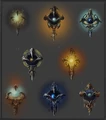The Magic
| |
|---|---|
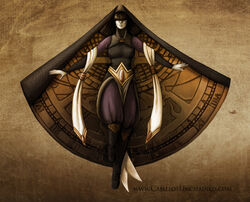
|
The magic system is designed to provide the player in combat (primarily Mages) with both power and flexibility, balanced with appropriate costs. It is based on four different concepts: the Spellbook, the component system, the A.I.R. system, and environmental effects often connected with the Veil and Veilstorms.
Another, newly introduced aspect of the magic are spirit pets, with one Pet Class per Realm.
Overview[ | ]
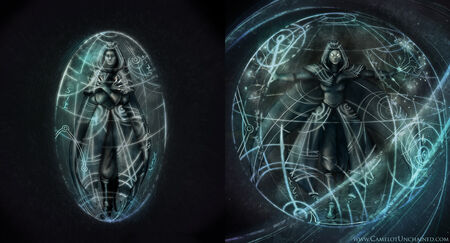
A mage in action
- The magic system of Camelot Unchained is intended to be a unique expression of the concept of magic in MMORPGs
- Intended to have an unmatched degree of customization through the component system
- Interaction of spells on the battlefield take RvR to the next level
- Intended to add immersion and customization through the use and growth of the Spellbook
- Geared to players who want to have more control over their characters, and are willing to spend time experimenting with spells and combinations
- Requires players to spend more time talking, reacting, and working as a team during sieges, as opposed to "mashing buttons"
- A.I.R. system intended to add even more immersion to the world, while increasing player cooperation and Realm bonding
Goals of the Magic System[ | ]
- Require more thought and effort from players than magic systems in the vast majority of MMORPGs
- Create a system through which players can have a great degree of customization and control of their magical abilities
- Add a degree of unpredictability to your abilities in RvR to add to the challenge
- Reintroduce the concept of the spellbook, an important part of many PnP games, as well as lore and literature surrounding mages
- Magic system must be fun, and not tedious to use in RvR
- Any system must stand the strain and stress of high-end RvR combat: it must not take three hands to use
- It cannot just be a “button mashing” system
Core Magic System[ | ]
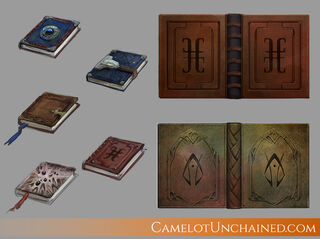
Spellbooks
- Magic spells are created by the player (not by the studio), by combining runes and other components such as reagents
- Runes represent specific magical forces, which may interact with one another in complimentary enemy use
- Core elements of fire, water, etc. are present, but each magic-using class has specialized runes as well, to prevent class mirroring
- The combination of runes to create magical interactions may take place during the spell creation process, or when multiple magic spells affect one another in combat
- Runes form the “core” spell, but players also have a wide range of other components that they can add to the spell, in order to customize their magic even further
- All mages are given a spellbook in which to inscribe their spells
- Spellbooks can level with the player as the runes and the player’s skill with them increases
- A spellbook also acts similarly to an “achievement” system, where it records failures, successes, combinations of runes, etc.
- Magic spells, once cast, become the equivalent of objects on the battlefield
- They can interact with players, NPCs and other spells
- Spell-to-spell interaction can lead to a wide range of outcomes such as cancellations, enhancements, and transformation
Using Magic[ | ]
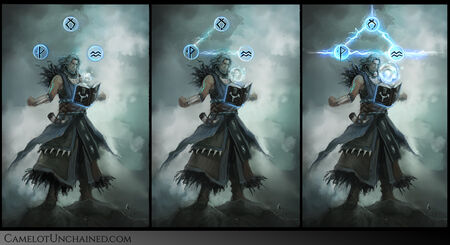
Phases of spellcasting - Viking Mage
Spells can be cast multiple ways, such as through a spellbook or charged item.
- CSE is considering the potential of “live” building of spells during combat
- Spells always have a chance to critically succeed or fail
- Spellcasting result is modified based on proficiency with the components used
- Spellcasting result can also be modified by external factors, such as interrupts and buffs/debuffs on the player, as well as player stats such as Panic Rating
- When casting, spells can be held for a brief time before being released
- Spells can use components infused with reagents (which may be difficult to find in the world), in order to enhance their effects
The Environment[ | ]
In Foundational Principle #8, Mark Jacobs explains: "We will look at adding a lot of randomness to the environment in terms of how not only it evolves over time naturally but also how the effects of magic that the players inject into the environment can also affect it over time as well. The landscape should change not just because of seasons (which would, IMO, be a good addition to this game) but also because the players are throwing around the equivalent of small, tactical nuclear devices like guests used to throw rice at wedding receptions.
We will try to incorporate the consequences of summoning and tossing around so much power into the game in order to throw, every so often, what amounts to a curveball (or would that be a curvefireball?) at the players. This could manifest in all manner of ways including creating temporary “dead spaces” where magic might not work or maybe areas where magic works just a wee bit too well. It could also mean that the geography of an area could suddenly change or even that certain beings might manifest themselves within the world quite unexpectedly and with rather interesting results." [1]
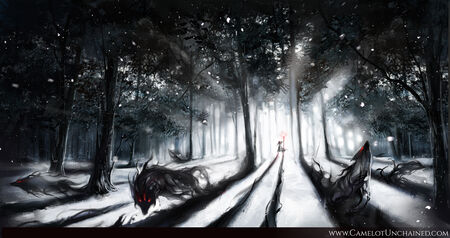
Spirit Wolves obeying their master
Environment has the potential to affect spells and, in turn, spells have the potential to affect the environment. Season, in-game time, and previous Veilstorm effects may all cause changes in the effectiveness of magic in general, or specific spells. Large amounts of magic in an area might trigger small Veilstorms with their own environmental effects. [2]
Many outside factors can affect the casting of spells, such as:
- Various ley lines throughout the world
- Weather
- Seasons
- Day/night
- Casting too many spells in an area may cause Veilstorms to appear
- Veilstorms have varying effects on magic used in the area
- Spells can use components infused with reagents (which may be difficult to find in the world), in order to enhance their effects
Balancing Costs[ | ]
Because the system is built around powerful effects, there are also costs that are present in the system to keep it balanced. Mages will have very limited motion or no motion at all while casting. Blood cost will weaken the mage as blood is expended. Spells will take time to cast, with limited instant casts. Spellbooks will have to be replaced, much as weapons and armor will need replaced for other classes. Spell failures might result in a backfire. [2]
Magic and Crafting[ | ]
Although crafting is described as being somewhat magical, it relies on a different system, based on the Vox Magus instead of being based on a spellbook. [3][2]
Gallery[ | ]
Vines[ | ]
Images[ | ]
- A6ab0372-2376-4800-8c91-5cf3cd5a83f0.jpg
Mage armor, including wearable enchanted scrolls
Videos[ | ]
BSC Days Magic System:
Q&A Magic System:
Part 1 (skip to 1:35):
Part 2:
Part 3:
Part 4:
Q&A Magic 2:
Part 1 (skip to 2:00):
Part 2:
Mage armor update (skip to 1:50):
Q&A Mage Armor:
Part 1 (skip to 0:50):
Part 2:
Part 3:
Part 4:


